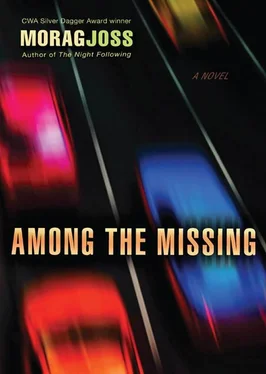
Morag Joss
Among the Missing aka Across the Bridge
Among the Missing is a work of fiction. Names, characters, places, and incidents either are the product of the author’s imagination or are used fictitiously. Any resemblance to actual persons, living or dead, events, or locales is entirely coincidental.
Copyright © 2011 by Morag Joss
For the ones who are still missing
Thousands of people are reported missing each year, yet very little is understood about who they are, why they disappear and what happens to them. It is known that most people go missing intentionally, to escape family or other problems. Adults most at risk of going missing are those going through a crisis or a difficult transition.
The likelihood of missing adults being traced and possibly reunited with their loved ones decreases over time. Among those who are ever found alive, only one in five returns.
Nina Biehal, Fiona Mitchell, and Jim Wade ,
Lost from View: Missing Persons in the UK
(Bristol: Policy Press, 2003) ,
research undertaken by the University of York in partnership
with the National Missing Persons Helpline

When Ron was first released, he discovered that prison had made him observant, as if he’d been reminded there, by its sudden absence, of the world’s surfeit of objects, its gross overabundance of things to look at. Not beautiful things. It wasn’t a case of seeing the world’s wonders anew or anything like that; rather, it was the opposite. Observation didn’t sharpen his faculties, it stupefied them. He was dazed by the quantity and variety, the massive, compacted volume of it all; he noticed everything but had no idea what was worth his notice. People’s faces and brick walls, town gutters and plowed fields, church towers and shop fronts, all claimed his attention equally. He couldn’t discriminate, nor could he locate in himself a particular attitude to any of it beyond disorientation, sometimes mild alarm. He surveyed the burgeoning, seething material of other people’s lives and very little moved him.
After a while, his alarm grew. He began to think there must be some invisible force at work in the world, some unstoppable law of accretion that filled up every surface and corner with streets, office blocks, rivers, factories, houses. Only he seemed to see it, this chaotic, impossible density, all this hoarding and flowing over; was nobody else concerned? If it went on like this, someday the whole planet would clog up and there would not be enough room in the sky for all the crisscrossing exhaust trails of planes, or on the sea for the countless interweaving, frothy wakes of ships. Swirling lines of traffic would spill off the teeming highways. Already there was no such thing as an unfilled space; it was impossible to see nothing . However deserted or arbitrarily spacious, every inch of the world was a place taken up and touched in some way, claimed for one purpose or another, even if it was, as he found in Scotland, to be left bare so that people could see it empty. But there was no true emptiness, no real nothingness, no desert stillness , a phrase that came into his mind and he now wished were more than a phrase. Everywhere-crowded and disorderly, or deliberately pristine-was somewhere, laden with the paraphernalia and expectation of some human design, and in not one of these places was his presence relevant. He tried not to think about it. He tried not to panic, and to concentrate instead on tiny things, one at a time.
He practiced on people. In cafés and checkout queues he would study them, and take in only physical details: the curve of an ear, a ridged fingernail, the asymmetric lift of one eyebrow. Every feature was odd in some way, once he focused on it, not that this disappointed him at all, for he was not looking for perfection or hoping to find a special value in the unique. He simply noticed and remembered. He filed every detail in his mind disjointedly and without cross-reference, each alone for its isolated, particular, frangible self. He welcomed this dullness of perception in himself, for it would have been unbearable to dwell on anything more than how precious and how breakable were these vulnerable, separate, flawed parts of other people’s bodies. Sometimes he knew he was staring at a stranger too hard and should apologize, but he didn’t know what to be sorry for. For not knowing how his own mind worked? For not being sure he bore more than a trivial surface resemblance to other human beings anymore?
He would have liked someone to tell it all to. He called his sister. She told him it would be fine for him to come for a few days if it was up to her, but Derek wasn’t ready to see him.
“Listen, Ron, he accepts it was an accident,” she said. “So do I. But he’s just not ready, you know?”
Ron did know, but he said nothing.
“I mean, Ron, criminal negligence is, well, what it says. You know?”
“I know,” he said.
“And as Derek says, six children died. Plus the pregnant woman. Give us a few months.”
“I’ve been in prison over five years.”
“And then he says, it just makes us look at our two and think, you know? Anyway, the extension’s not finished.”
He left her another couple of messages. Then she sent him a big check with a note saying she trusted the enclosed would help him make a fresh start “somewhere new.” She’d be in touch, she wrote.
He called his former neighbor Jeff and thanked him for the card. It had meant a lot, he said, on his first Christmas in prison.
“That’d be Lynne,” Jeff said. “She sends cards to everybody.”
He left the words even you unspoken, but Ron heard them nonetheless.
“How’s Kathy? Has Lynne seen her?”
Jeff hesitated. “They’re in touch, yeah. Doing better. Knocks you sideways, divorce, never mind everything else she’s had to contend with.”
Ron said it would be good to meet up for a drink. They agreed on a day the following week. The next day Jeff sent a text message to say he couldn’t make it and he’d call soon, but he didn’t.
They’d found him a room for the first month, and a social worker, and he worked the night shift for a while in a bakery, standing on a line wrapping buns and cakes in a warm, yellow-lit factory that smelled of sugar icing and machine oil. His fellow workers were all women who spoke rapidly to one another in their own language and ignored him except to pass on commands about cellophane or cardboard boxes.
To get away from all of that he cashed his sister’s check, bought an old Land Rover, and reverted to his life’s previous pattern, the covering of distances. He knew how to measure a day or night in miles rather than in hours on a factory clock, and he found comfort in the old equation of roads traveled versus time spent equals a portion of his life somehow suspended in transit. As a boy he’d been fascinated by time zones, which he could hardly distinguish from time travel; if you went west crossing zone after zone, going always back in time, one day would you be a man of twenty-one in a high chair with a bib and a spoon? Or going always east and forward, would you find yourself stooped and white-haired and still ten years old? It couldn’t be so, of course, but he had concluded then that the secret was to keep moving. Forget about direction and destination, just keep moving, and surely your life would never be able to catch you up with restrictions and obstacles and all its weighty boredom.
Читать дальше














